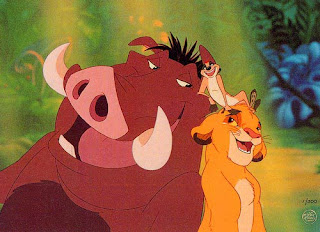
I'm sure most of us have seen The Lion King. In fact, I'd guess that almost all of us can sing the catchy and fun song that Timon, Pumba, and Simba bust out mid-movie, "Hakuna Matata." What exactly does Hakuna Matata mean anyways? Do you remember from the movie? I'm sure you do, let's take a look at the lyrics.
Hakuna Matata! What a wonderful phrase.
Hakuna Matata! Ain't no passing craze.
It means no worries for the rest of your days.
It's our problem-free philosophy.
Hakuna Matata!
Wait a minute. What kind of message are kids getting from this movie? I thought The Lion King was wholesome and uplifting, but according to this scene, it would appear as though the movie's "theme" is one of lack of responsibility or how running away from your responsibilities brings you happiness and friends. Hmmm....interesting. Let's think this through.
This is a great example and has the potential to lead to a constructive conversation with young people. Sure, taken out of context this scene appears to be teaching our children all the wrong things about life. But, when viewed as a whole with the rest of the movie, we get a better understanding of the Hakuna Matata way of life and how it falls short.
Using this film as a visual, take the opportunity to talk to your children about the implicit meanings found in the media around them. Ask them what this scene from The Lion King is saying and if they agree with the message. What's the message of the movie? Do they agree with it?
When discussing other media examples with your children, ask them what the movie, the commercial, the scene, the story, etc. is trying to say or what it's implying.
Helping our children recognize the meanings (both explicit and implicit) behind the media they consume is an important step to empowering them and helping them become media literate.



 I'm sure most of us have seen The Lion King. In fact, I'd guess that almost all of us can sing the catchy and fun song that Timon, Pumba, and Simba bust out mid-movie, "Hakuna Matata." What exactly does Hakuna Matata mean anyways? Do you remember from the movie? I'm sure you do, let's take a look at the lyrics.
I'm sure most of us have seen The Lion King. In fact, I'd guess that almost all of us can sing the catchy and fun song that Timon, Pumba, and Simba bust out mid-movie, "Hakuna Matata." What exactly does Hakuna Matata mean anyways? Do you remember from the movie? I'm sure you do, let's take a look at the lyrics.